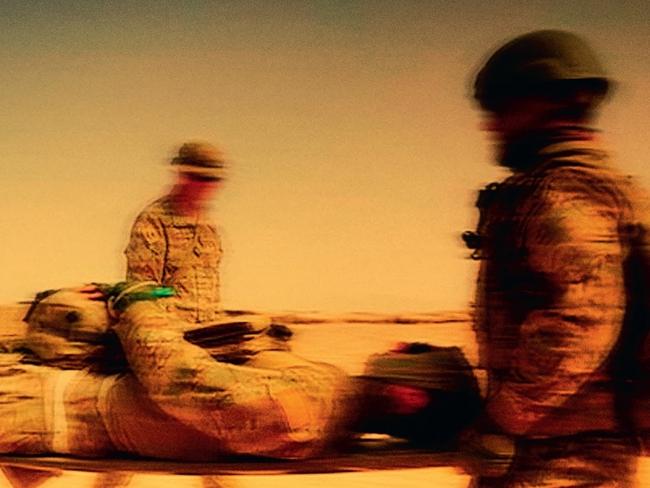War injuries and doctors’ bravery inform Khadra’s Honour, Duty, Courage
Doctor-author Mohamed Khadra’s novel draws on the real experiences of front-line medicos in the world’s trouble spots.

The fictional approach often works best when dealing with truly gruesome events. Massacres and other brutality can be easier on the reader when the narrative is constructed with fictional place names and characters.
Timothy Mo’s 1991 novel The Redundancy of Courage is a superb example of this approach. Mo powerfully and accurately portrays the horror of Indonesia’s bloody invasion and subjugation of East Timor in a fictional half-island place called Danu.
Doctor-author Mohamed Khadra, who is professor of surgery at the University of Sydney, has followed suit in a new book about front-line medicos in some of the most troubled places in the world: Rwanda, post-tsunami Aceh, Timor and the Middle East.
Honour, Duty, Courage is the result of interviews with more than two dozen of these professionals, most of them army reservists. Khadra has taken their stories and constructed a narrative based on two best mates, surgeon Jack Foster and anaesthetist Tom McNeal, friends since primary school who went on to study medicine together. At home, the two spend long days operating on people whose bodies are falling apart after a lifetime of bad habits.
After about a year in the reserves, the two are called up at short notice and soon find themselves aboard a C-130 Hercules flying into the front line of a civil war in fictional Equatoria. The book’s tempo picks up as Khadra describes the lumbering plane’s approach to an airfield surrounded by rebels. It makes a steep descent, then jerks upwards as the runway approaches, before disgorging its cargo and passengers in just two minutes.
From this moment, it’s game on for these doctors and their support staff as they deal with a steady stream of seriously wounded civilians and foreign peacekeepers. The makeshift surgery becomes a treadmill of round-the-clock and often bizarre operations.
But this hospital is no enclave: the medicos mix closely with the community because some of the nurses are locals. Foster and McNeil go into the field and witness massacre sites. They work with Agnes, a local nurse who admits to having killed both her parents to spare them from being hacked to death by the rebels.
Patients are brought to the hospital with barely imaginable injuries. One woman is dumped at the gate, impaled by a large wooden beam. A German nun is brought in with a mine sewn into her abdomen; the two doctors keep her alive while a bomb disposal expert removes the mine.
The mutilation of women and girls is a standard tactic of the rebels, with horrific consequences. The two weary doctors are forced to make split-second decisions about who lives and who dies. One such decision comes back to haunt McNeal. They also operate on rebel fighters, even though they soon realise that these patients will later face a quick trial followed by execution by government forces.
At times the intensity of this book overwhelms. Readers might be left guessing as to how much of this book is fictional, although a close reading of the author’s note indicates it’s all based on real experiences.
It’s clear Khadra’s purpose is pay homage to the efforts of people who volunteer to walk into valleys of death and deliver desperately needed medical care.
As he makes clear at the outset, these medicos represent “the true meaning” of their profession. He is scathing of the “pretenders and the hypocrites” who are mainly concerned with making money. Khadra says he found the experience of interviewing these people truly inspirational and it reinvigorated his commitment to the medical profession.
“Their stories, their amazing experiences and their sense of duty reinvigorated my optimism and gave me another thirty years of life in this profession,” he writes.
While this book is a great work of fiction, Khadra has touched on a big subject that is crying out for nonfiction treatment. Australians should know more about these brave people and the sacrifices they and their families make.
Paul Cleary is a journalist at The Australian and the author of four books.
Honour, Duty, Courage
By Mohamed Khadra
William Heinemann, 272pp, $34.99.



To join the conversation, please log in. Don't have an account? Register
Join the conversation, you are commenting as Logout